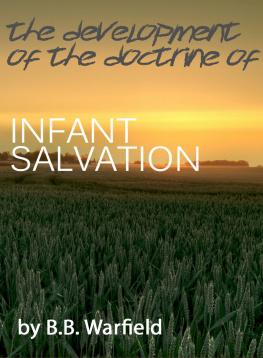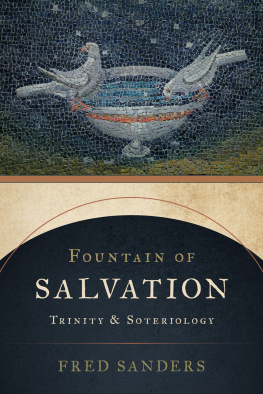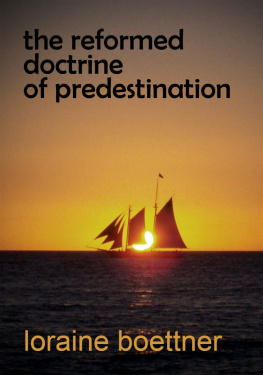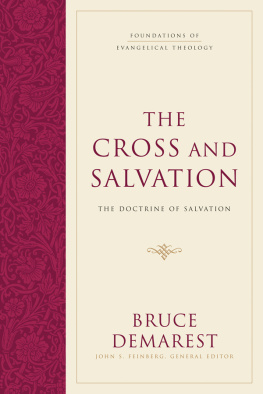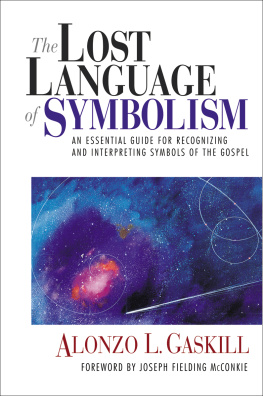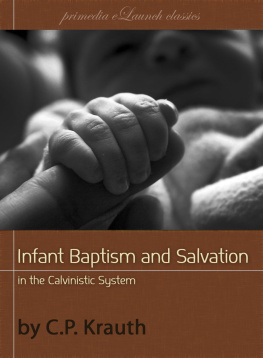Benjamin Breckinridge Warfield - The development of the doctrine of infant Salvation
Here you can read online Benjamin Breckinridge Warfield - The development of the doctrine of infant Salvation full text of the book (entire story) in english for free. Download pdf and epub, get meaning, cover and reviews about this ebook. City: New York, year: 1891, publisher: Christian Literature, genre: Religion. Description of the work, (preface) as well as reviews are available. Best literature library LitArk.com created for fans of good reading and offers a wide selection of genres:
Romance novel
Science fiction
Adventure
Detective
Science
History
Home and family
Prose
Art
Politics
Computer
Non-fiction
Religion
Business
Children
Humor
Choose a favorite category and find really read worthwhile books. Enjoy immersion in the world of imagination, feel the emotions of the characters or learn something new for yourself, make an fascinating discovery.
- Book:The development of the doctrine of infant Salvation
- Author:
- Publisher:Christian Literature
- Genre:
- Year:1891
- City:New York
- Rating:5 / 5
- Favourites:Add to favourites
- Your mark:
- 100
- 1
- 2
- 3
- 4
- 5
The development of the doctrine of infant Salvation: summary, description and annotation
We offer to read an annotation, description, summary or preface (depends on what the author of the book "The development of the doctrine of infant Salvation" wrote himself). If you haven't found the necessary information about the book — write in the comments, we will try to find it.
The development of the doctrine of infant Salvation — read online for free the complete book (whole text) full work
Below is the text of the book, divided by pages. System saving the place of the last page read, allows you to conveniently read the book "The development of the doctrine of infant Salvation" online for free, without having to search again every time where you left off. Put a bookmark, and you can go to the page where you finished reading at any time.
Font size:
Interval:
Bookmark:
THE DEVELOPMENT OF THE DOCTRINE OF INFANT SALVATION
BENJAMINB WARFIELD,
Professorin Princeton Seminary.
THE task which we set before us in this brief paper is notto unravel the history of opinion as to the salvation of infants dying ininfancy, but the much more circumscribed one of tracing the development ofdoctrine on this subject. We hope to show that there has been a doctrine as tothe salvation of infants common to all ages of the Church; but that there hasalso been in this, as in other doctrines, a progressive correction of cruditiesin its conception, by which the true meaning and relations of the commonteaching have been freed from deforming accretions and its permanent corebrought to purer expression.
It is fundamental to the very conception of Christianitythat it is a remedial scheme. Christ Jesus came to save sinners. The firstChristians had no difficulty in understanding and confessing that Christ hadcome into a world lost in sin to establish a kingdom of righteousness,citizenship in which is the condition of salvation. That infants were admittedinto this citizenship they did not question; Irenaeus, for example, finds itappropriate that Christ was born an infant and grew by natural stages intomanhood, since "he came to save all by himselfall, I say, who by him areborn again unto God, infants and children, and boys and young men, and old men,"and accordingly passed through every age that he might sanctify all. Nor didthey question that not the natural birth of the flesh, but the new birth of theSpirit was the sole gateway for infants too, into the kingdom; communion withGod was lost for all alike, and to infants too it was restored only in Christ.the latter mitigation was not allowed in the case of infants. The wholePatristic Church agreed that, martyrs excepted, no infant dying unbaptizedcould enter the kingdom of heaven.
The fairest exponent of the thought of the age on thissubject is Augustine, who was called upon to defend it against the Pelagianerror that infants dying unbaptized, while failing of entrance into thekingdom, yet obtain eternal life. His constancy in this controversy has won forhim the unenviable title of darus infantum pater& designationdoubly unjust, in that not only did he neither originate the obnoxious dogmanor teach it in its harshest form, but he was even preparing its destruction bythe doctrines of grace, of which he was more truly the father.or such obscure and erratic individuals as Vincentius Victor whom Augustineconvicts, in the whole Patristic age, doubted that the kingdom of heaven wasclosed to all infants departing this life without the sacrament of baptism.
If the general consent of a whole age as expressed by itschief writers, including the leading bishops of Rome, and by its synodicaldecrees, is able to determine a doctrine, certainly the Patristic Churchtransmitted to the Middle Ages as de fide that infants dying unbaptized(with the exception only of those who suffer martyrdom) are not only excludedfrom heaven, but doomed to hell. Accordingly the mediaeval synods so define;the second Council of Lyons and the Council of Florence declare that "thesouls of those who pass away in mortal sin or in original sin alone descendimmediately to hell, to be punished, however, with unequal penalties." Onthe maxim that gradus non mutant speciem we must adjudge Petavius'sargumentThe novel doctrine attained papal authority by a decree of Innocent III. (c.1200), who determined "the penalty of original sin to be the lack of thevision of God, but the penalty of actual sin to be the torments of eternalhell."
A more timid effort was also made in this period to modifythe inherited doctrine by the application to it of a development of the baptismof intention. This tendency first appears in Hincmarof Rheims (882), who, in aparticularly hard case of interdict on a whole diocese, expresses the hope that"the faith and godly desire of the parents and godfathers" of theinfants who had thus died unbaptized, "who in sincerity desired baptismfor them but obtained it not, may profit them by the gift of Him whose spirit(which gives regeneration) breathes where it pleases." It is doubtful,however, whether he would have extended this lofty doctrine to any lessstringent case.His followers were less cautious, whether in England or Bohemia, and in this,too approved themselves heralds of a brighter day.
In the upheaval of the sixteenth century the Church of Romefound her task in harmonizing under the influence of the scholastic teaching,the inheritance which the somewhat inconsistent past had bequeathed her. Fourvarieties of opinion sought a place in her teaching. At the one extreme theearlier doctrine of Augustine and Gregory, that infants dying unbaptized suffereternally the pains of sense, found again advocates, and that especially amongthe greatest of her scholars, such as Noris, Petau, Driedo, Conry, Berti. Atthe other extreme, a Pelagianizing doctrine that excluded unbaptized infantsfrom the kingdom of heaven and the life promised to the blessed, and yetaccorded to them eternal life and natural happiness in a place between heavenand hell, was advocated by such great leaders as Ambrosius Catharinus, AlbertusPighius, Molina, Sfondrati. The mass, however, followed the schoolmen in themiddle path of poena damni, and, like the schoolmen, only differed as towhether the punishment of loss involved sorrow (as Bellarmine held) or waspurely negative.
The Tridentine deliverance, of course, does not exclude thebaptism of blood as a substitute for baptism of water. Neither does it seemnecessarily to exclude the application of a theory of baptism of intention toinfants. Even after it, therefore, a twofold development seems to have beenpossible. The path already opened by Gerson and Biel might have been followed out,and a baptism of intention developed for infants as well as for adults. Thismight even have been pushed on logically, so as to cover the case of allinfants dying in infancy. On the principle argued by Richard Hooker,
The application of the baptism of intention to infants wasnot abandoned, however, without some protest from the more tenderhearted.Cardinal Cajetan defended in the Council of Trent itself Gerson's propositionthat the desire of godly parents might be taken in lieu of the actual baptismof children dying in the womb.which has preferred to hold fast to the dogma that the failure of baptism ininfants, dying such, excludes ipso facto from heaven, and to seek itscomfort in mitigating still farther than the scholastics themselves the natureof that poena damni which alone it allows as punishment of original sin.
And if we may assume that such writers as Perrone, Hurter,Gousset, and Kendrick are typical of modern Roman theology throughout theworld, certainly that theology may be said to have come, in this pathway ofmitigation, as near to positing salvation for all infants dying unbaptized asthe rather intractable deliverances of early popes and later councils permit tothem. They all teach, of course (as the definitions of Florence and Trentrequire of them)in the words of PerroneOur interest as historians of opinion is exhausted in simply noting the factthat the Pelagianizing process, begun in the Middle ages by assigning toinfants guilty only of original sin liability to poena damni alone,culminates in our day in their assignment by the most representativetheologians of modern Rome to a natural paradise.
It is, no doubt, as a protest against the harshness of theRomanist syllogism, "No man can attain salvation who is not a member ofChrist; but no one becomes a member of Christ except by baptism, receivedeither
Next pageFont size:
Interval:
Bookmark:
Similar books «The development of the doctrine of infant Salvation»
Look at similar books to The development of the doctrine of infant Salvation. We have selected literature similar in name and meaning in the hope of providing readers with more options to find new, interesting, not yet read works.
Discussion, reviews of the book The development of the doctrine of infant Salvation and just readers' own opinions. Leave your comments, write what you think about the work, its meaning or the main characters. Specify what exactly you liked and what you didn't like, and why you think so.

